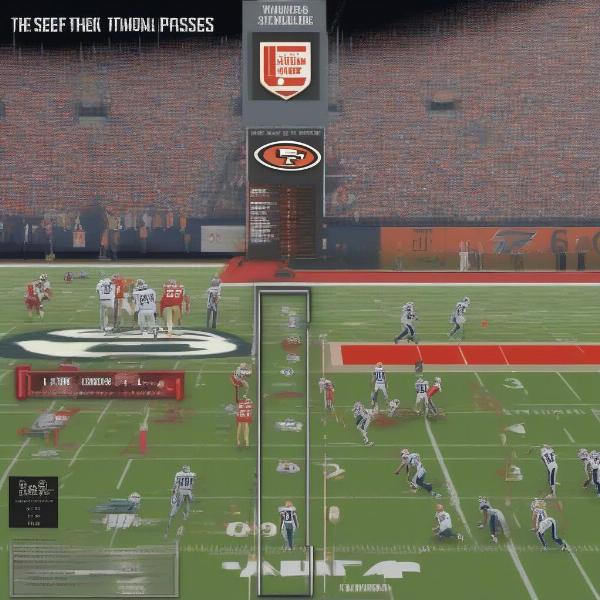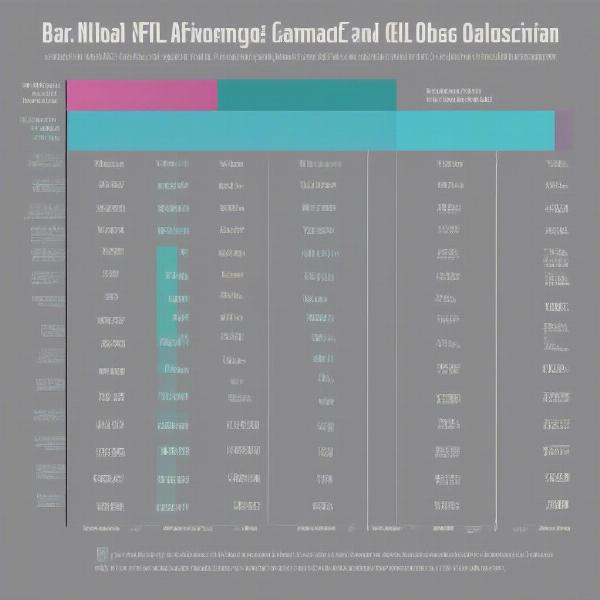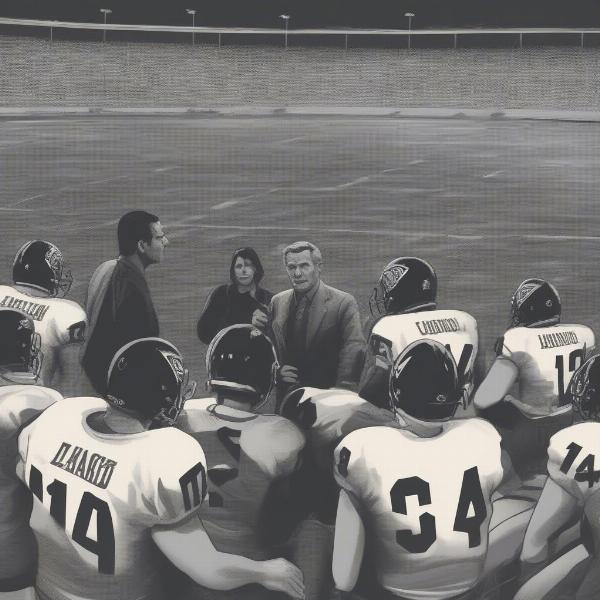A typical NFL game broadcasts for about three hours, but the actual game time is significantly shorter. Understanding how long a pro football game lasts involves considering various factors, from regulation play to overtime possibilities, commercial breaks, and half-time shows. Let’s dive into the details and break down the timing of a professional football game.
Decoding NFL Game Time
A regulation NFL game consists of four 15-minute quarters, totaling 60 minutes of game time. However, the clock frequently stops for various reasons, such as incomplete passes, penalties, timeouts, and changes of possession. This makes the actual time elapsed much longer than 60 minutes. On average, a pro football game lasts around 3 hours and 12 minutes.
Factors Influencing Game Duration
Several factors contribute to the overall length of a pro football game:
- Commercial Breaks: Frequent commercial breaks are a significant contributor to the extended broadcast time. These breaks occur after scoring plays, changes of possession, and timeouts.
- Halftime Show: The halftime show, a staple of NFL games, typically lasts between 12 and 15 minutes, adding to the overall broadcast length.
- Injuries and Reviews: Player injuries and official reviews can cause unexpected delays in the game, adding to the overall time.
- Overtime: If a game is tied at the end of regulation, overtime periods of 10 minutes (regular season) or 15 minutes (playoffs) are played until a winner is determined. Overtime significantly extends the length of a game.
- Pace of Play: The offensive and defensive strategies employed by the teams can influence the pace of the game. Teams that favor running the ball or frequently call timeouts may contribute to a longer game.
 NFL Game Clock Stoppage Reasons
NFL Game Clock Stoppage Reasons
What About College Football?
While similar in structure, college football games tend to be slightly longer than NFL games, often exceeding 3 hours and 30 minutes. This difference is largely attributed to the way the clock is managed. In college football, the clock stops after first downs, leading to more stoppages and a longer overall game time.
Understanding College Football Timing
The clock management rules in college football contribute significantly to the extended game duration:
- Clock Stoppage After First Downs: The clock stops after every first down in college football, allowing teams to regroup and reset their strategy. This results in more frequent stoppages and a longer overall game time.
- Longer Halftime: College football halftime shows are often longer than those in the NFL, typically ranging from 20 to 30 minutes, further extending the broadcast.
- Overtime Rules: Similar to the NFL, college football utilizes overtime periods to determine a winner in tied games. Overtime rules in college football can be complex, potentially leading to extended game times.
 Comparison of NFL and College Football Game Times
Comparison of NFL and College Football Game Times
The Two-Minute Warning: A Crucial Moment
The two-minute warning in the NFL signifies a critical juncture in the game. It provides both teams with a strategic timeout and often leads to heightened tension and exciting plays. This two-minute period can significantly impact the outcome of the game.
Strategic Implications of the Two-Minute Warning
The two-minute warning provides teams with an opportunity to reassess their strategy and make crucial decisions:
- Timeout Allocation: Coaches carefully manage their remaining timeouts during this period, using them strategically to stop the clock and preserve time for potential game-winning drives.
- Offensive and Defensive Adjustments: Teams often implement specific two-minute offense and defense strategies, prioritizing quick plays and aggressive tactics.
- Increased Importance of Clock Management: Every second becomes crucial during the two-minute warning, with teams meticulously managing the clock to maximize their chances of victory.
 NFL Two-Minute Warning Strategy
NFL Two-Minute Warning Strategy
Why Do Football Games Take So Long? A Fan’s Perspective
From a fan’s perspective, the extended length of football games can be both a blessing and a curse. The long duration allows for ample time to socialize, enjoy the stadium atmosphere, and savor the game’s unfolding drama. However, it can also be a test of patience, particularly for viewers at home or those with busy schedules.
Conclusion
So, How Long Does A Pro Football Game Last? While the official game time is 60 minutes, the actual time elapsed is significantly longer, averaging around 3 hours and 12 minutes for NFL games and even longer for college football. Factors like commercial breaks, halftime shows, injuries, reviews, overtime, and pace of play all contribute to the overall game duration. Understanding these factors provides a clearer picture of the time commitment involved in watching a professional football game, allowing fans to plan accordingly and enjoy the full experience. Next time you tune in, remember that the clock on the field only tells part of the story.
FAQ
- What is the average length of an NFL game? Around 3 hours and 12 minutes.
- Why are college football games longer than NFL games? Primarily due to the clock stopping after first downs and longer halftimes.
- How long is overtime in the NFL? 10 minutes in the regular season and 15 minutes in the playoffs.
- What is the two-minute warning? A strategic timeout in the NFL occurring two minutes before the end of each half.
- What factors contribute to the length of a football game? Commercial breaks, halftime, injuries, reviews, overtime, and pace of play.
- How long is a regulation NFL game without stoppages? 60 minutes (four 15-minute quarters).
- How long is halftime in college football? Typically between 20 and 30 minutes.

